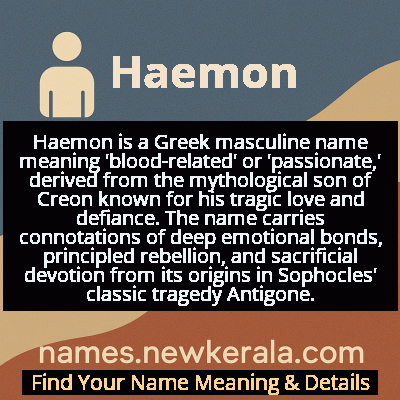Haemon Name Meaning & Details
Origin, Popularity, Numerology Analysis & Name Meaning of Haemon
Discover the origin, meaning, and cultural significance of the name HAEMON. Delve into its historical roots and explore the lasting impact it has had on communities and traditions.
Name
Haemon
Gender
Male
Origin
Greek
Lucky Number
2
Meaning of the Name - Haemon
Haemon is a Greek masculine name meaning 'blood-related' or 'passionate,' derived from the mythological son of Creon known for his tragic love and defiance. The name carries connotations of deep emotional bonds, principled rebellion, and sacrificial devotion from its origins in Sophocles' classic tragedy Antigone.
Haemon - Complete Numerology Analysis
Your Numerology Number
Based on Pythagorean Numerology System
Ruling Planet
Moon
Positive Nature
Diplomatic, friendly, artistic, empathetic.
Negative Traits
Over-sensitive, moody, indecisive, prone to self-pity.
Lucky Colours
Green, cream, white.
Lucky Days
Monday.
Lucky Stones
Pearl, moonstone.
Harmony Numbers
1, 3, 4.
Best Suited Professions
Diplomats, mediators, caregivers, artists.
What People Like About You
Cooperative spirit, friendliness, artistic talent.
Famous People Named Haemon
Haemon of Thebes
Mythological Prince
Tragic figure who defied his father King Creon for love of Antigone
Haemon (Sophoclean Character)
Literary Figure
Central character representing youthful idealism in Greek tragedy
Haemon (Academic Subject)
Classical Studies Reference
Frequently analyzed character in Greek literature studies
Name Variations & International Equivalents
Click on blue names to explore their detailed meanings. Gray names with will be available soon.
Cultural & Historical Significance
The character's cultural impact extends beyond classical literature into political philosophy, psychology, and gender studies. Haemon's challenge to patriarchal authority and his emotional vulnerability make him a complex figure who defies simple masculine archetypes. His ultimate suicide alongside Antigone creates one of literature's most powerful statements about the lengths people will go for love and principle. This multidimensional portrayal has influenced countless later works exploring similar themes of rebellion, love, and the costs of moral absolutism.
Extended Personality Analysis
The name Haemon evokes a personality marked by deep emotional intensity, strong principles, and a tragic romantic sensibility. Those bearing this name are often perceived as idealistic and passionate, with a strong sense of justice that compels them to challenge authority when they perceive wrongdoing. They possess the courage to stand against popular opinion for what they believe is right, reflecting Haemon's defiance of his father Creon in defense of Antigone.
Haemon's personality archetype includes exceptional loyalty in relationships and a capacity for profound love that borders on the sacrificial. These individuals often demonstrate diplomatic skills and the ability to see multiple perspectives, though this can lead to internal conflict when forced to choose between competing loyalties. There's an inherent melancholy to the Haemon personality—a depth of feeling and sensitivity to suffering that gives them wisdom beyond their years. They tend to be reflective, philosophical individuals who grapple with life's moral complexities while maintaining a fundamentally compassionate worldview.
Modern Usage & Popularity
In contemporary naming practices, Haemon remains an exceptionally rare choice, primarily confined to academic families, classical enthusiasts, or those with specific Greek heritage connections. The name hasn't appeared on popular baby name charts in English-speaking countries, maintaining its status as a distinctive literary reference rather than a mainstream option. Modern usage typically reflects a deliberate choice to honor classical education or convey intellectual sophistication, with parents drawn to its tragic romantic associations and historical depth. While its tragic connotations might deter some, others appreciate the name's substantial cultural weight and the opportunity it provides for discussing important literary and philosophical themes with their child.
Symbolic & Spiritual Meanings
Haemon symbolizes the eternal struggle between heart and duty, representing the tragic beauty of love that defies social conventions and the devastating consequences of ideological inflexibility. The name carries profound metaphorical weight as an emblem of youthful idealism confronting established authority, serving as a timeless reminder of the importance of compassion over rigid principle. It embodies the symbolic tension between generations, between personal morality and public responsibility, and between the transformative power of love and the destructive nature of pride. Haemon's story serves as a cautionary symbol about the costs of failing to listen to reason and the tragic outcomes when communication breaks down between those who hold different truths.

